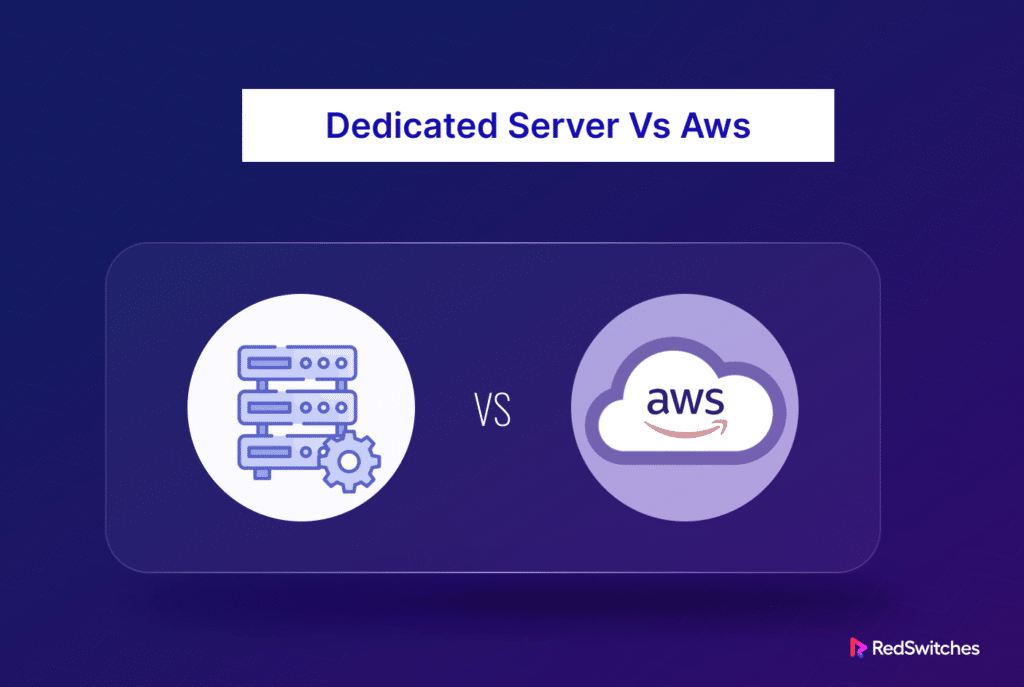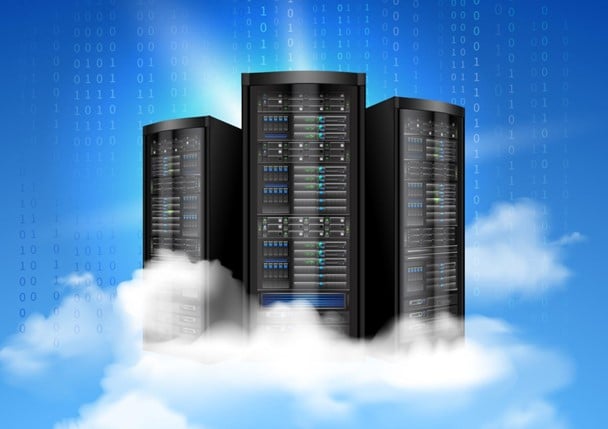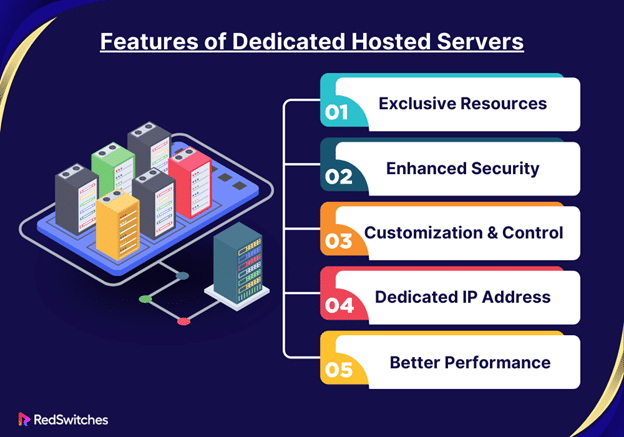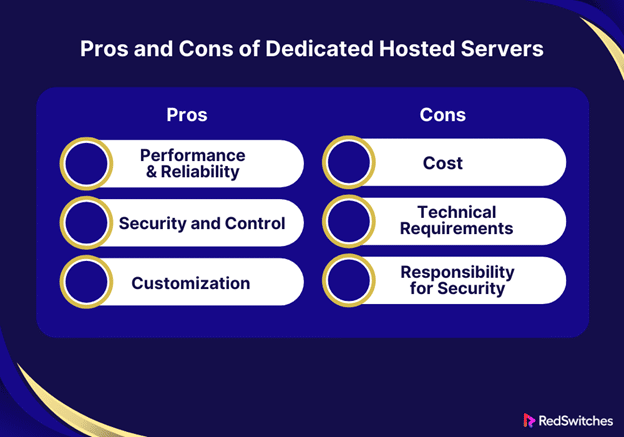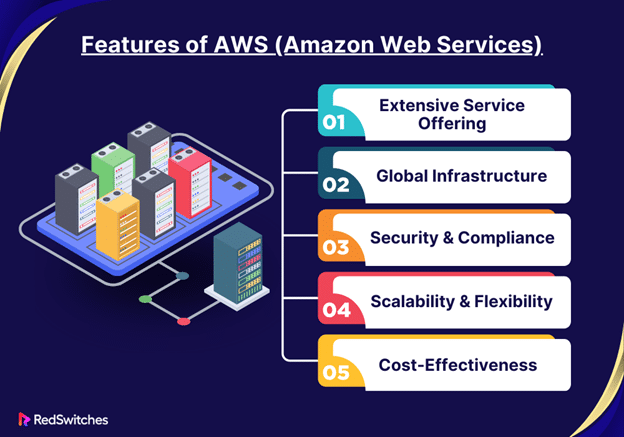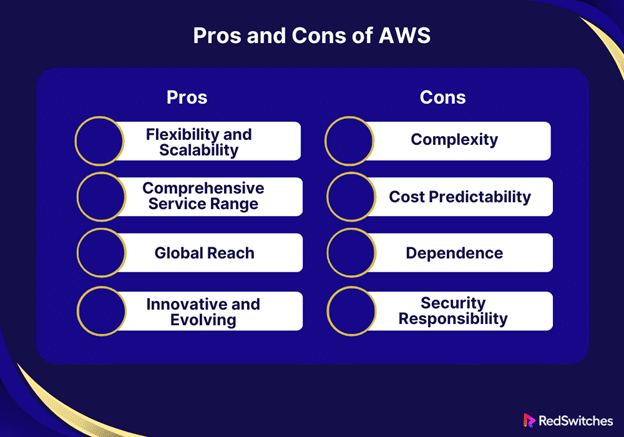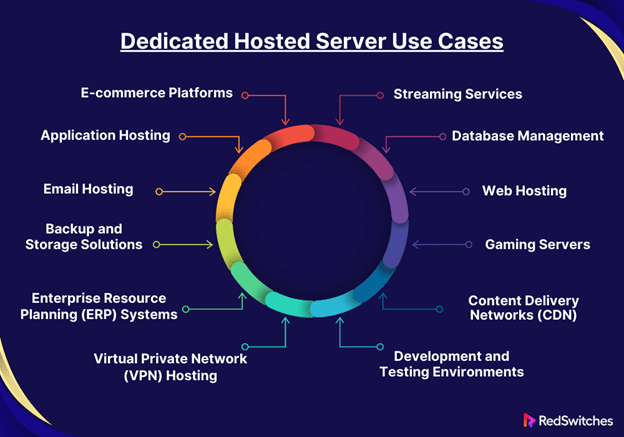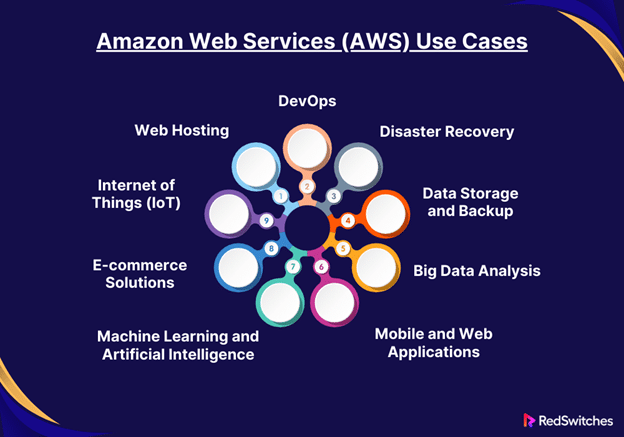Key Takeaways:
- Dedicated hosted servers offer unparalleled control, security, and performance for high-demand applications.
- AWS provides scalability, flexibility, and global reach for businesses with evolving needs.
- Choosing between dedicated hosted servers and AWS depends on specific business goals and technical requirements.
- Dedicated hosted servers are best for businesses with predictable workloads and high-performance needs.
- AWS is ideal for projects requiring rapid scalability and global accessibility.
- The cost-effectiveness of AWS vs. dedicated servers varies based on actual usage and workload fluctuations.
- RedSwitches is highlighted as a platform offering high-performance dedicated servers with robust security and support.
- Dedicated hosted servers allow for customization and are suitable for managing sensitive data and high-traffic sites.
- AWS supports a wide range of applications, from web hosting to IoT, offering tools for innovation and development.
- Making an informed choice between dedicated hosted servers and AWS can significantly impact your business’s digital infrastructure efficiency and growth.
In the world of online infrastructure, making the right choice is vital. This brings us to the “dedicated server vs AWS” debate. What’s best for your digital needs? On the one hand, dedicated hosted servers offer solid, powerful hosting. They’re all yours, giving top speed and security. On the other hand, AWS brings flexibility. It scales with you, adapting to your changing demands.
Choosing isn’t simple. It’s not just about cost or speed. It’s about what fits your project. Need full control and top performance? A dedicated hosted server might be your pick. Or, if your needs change often, AWS could be the way to go.
This guide aims to simplify this choice. Our goal is to help you understand what each can do for you. Let’s dive into the “dedicated server vs AWS” discussion to clarify the better fit for your online journey.
- Amazon Web Services (AWS) Use Cases
- Conclusion
- FAQs
What Are Dedicated Servers?
Credits: Freepik
Dedicated hosted servers are a cornerstone in the web hosting world. They are private servers dedicated to a single client. This means you don’t share resources with anyone else. Your website, application, or platform gets the server’s full processing power, memory, and storage.
Who Needs a Dedicated Hosted Server?
Dedicated hosted servers are ideal for large businesses, e-commerce sites, and high-traffic websites. They’re also great for companies with specific security, compliance, or performance needs.
These Servers offer powerful, secure, and customizable hosting solutions. They provide the performance and control that busy, resource-intensive websites require. While the cost is higher than shared hosting, the benefits make it a worthwhile investment for many businesses.
Also Read: The Beginner’s Checklist for Choosing a Dedicated Server Provider
Features of Dedicated Hosted Servers
These servers are powerful tools in web hosting. Here’s what separates them:
Exclusive Resources:
Unlike shared hosting, servers with dedicated resources are yours. This means all the server’s resources, like CPU, memory, and storage, are for your use alone.
Enhanced Security:
With a server with dedicated resources, security is in your hands. You’re not sharing space with others who might be vulnerable to attacks, making it a safer choice for sensitive data.
Customization and Control:
You can set up the server to meet your needs. From the operating system to the software, everything can be tailored.
Dedicated IP Address:
Each server comes with a unique IP address. This is crucial for businesses running e-commerce sites or those needing SSL for secure transactions.
Better Performance:
Since all resources are yours, your site can handle more traffic and process data faster. This leads to a smoother experience for your users.
Pros and Cons of Dedicated Hosted Servers
Understanding the advantages and disadvantages is key to deciding if a server with dedicated resources is right for you.
Pros:
- Performance and Reliability: With all resources dedicated to your website. You’ll see faster loading times and less downtime. This is great for sites with high traffic or demanding applications.
- Security and Control: You completely control the server’s security measures. This means you can implement whatever security protocols you deem necessary.
- Customization: You can configure your server any way you like. This flexibility is perfect for those with specific needs.
Cons:
- Cost: Dedicated hosted servers are more expensive than shared hosting or virtual private servers. The high price covers the exclusive use of the server’s resources and better performance, but it’s something to consider.
- Technical Requirements: Managing a server requires technical knowledge. You’ll need to handle updates, security measures, and troubleshooting. Unless you opt for managed services, which can increase the cost.
- Responsibility for Security: With great power comes great responsibility. You’re responsible for securing your server, which means staying on top of security patches and potential vulnerabilities.
Servers with dedicated resources offer a range of powerful features. This includes exclusive resources for enhanced security and customization options. They’re excellent for businesses with high traffic, demanding applications, or sensitive data. However, the cost and technical expertise required are significant considerations. Weighing the pros and cons will help you decide if a server fits your needs. With the right preparation and investment, a server can be a game-changer for your online presence.
What Is AWS?
Credits: AWS
AWS stands for Amazon Web Services. It is a comprehensive cloud platform offered by Amazon. AWS provides a wide range of services over the internet, such as computing power, storage options, and networking capabilities. It supports businesses in scaling and growing by offering these tools on a pay-as-you-go basis.
Who Needs AWS?
AWS, or Amazon Web Services, is a cloud platform that serves a wide range of users. Startups, large corporations, government agencies, and even individual developers can benefit from AWS. It’s perfect for anyone needing hosting for websites, storage for data, or computing power to run applications. With AWS, you can scale your resources up or down based on your needs. This makes it a great choice for businesses experiencing growth or those with fluctuating demands. Whether launching a new app, running complex data analysis, or simply storing vast amounts of data, AWS has the tools and services to support your objectives efficiently and cost-effectively.
Features of AWS
AWS (Amazon Web Services) is a cloud platform that offers a wide array of services to individuals, companies, and governments on a pay-as-you-go basis. Some of its standout features:
Extensive Service Offering:
AWS provides many services, including computing power, storage options, and networking capabilities. It also offers specific IoT, machine learning, and data analytics solutions.
Global Infrastructure:
AWS has a widespread global presence with data centers in numerous regions worldwide. This ensures lower latency and higher redundancy for hosted applications and services.
Security and Compliance:
AWS is known for its commitment to security. It offers users powerful tools to protect their infrastructure and data. AWS continuously meets various industry-specific compliance standards.
Scalability and Flexibility:
With AWS, scaling resources up or down based on demand is straightforward. This elasticity makes it an ideal choice for businesses experiencing fluctuating workloads.
Cost-Effectiveness:
The pricing model of AWS is pay-as-you-go. This means you only pay for the services and resources you use, which can lead to significant cost savings.
Pros and Cons of AWS
Pros:
- Flexibility and Scalability: AWS allows businesses to adjust their resource use as needed, making it easier to handle growth and traffic spikes without overpaying for idle resources.
- Comprehensive Service Range: AWS offers everything from basic hosting to advanced machine learning and artificial intelligence services, catering to a wide range of needs.
- Global Reach: With AWS’s extensive global network, businesses can serve customers from the closest data center, reducing latency and improving user experience.
- Innovative and Evolving: AWS regularly introduces new services and updates to existing ones, helping users stay at the forefront of technology trends.
Cons:
- Complexity: The number of services and options can overwhelm new users. Navigating the AWS ecosystem and optimizing resource use requires a steep learning curve.
- Cost Predictability: While AWS can be cost-effective, unexpected spikes in usage can lead to surprising charges. Managing and optimizing costs requires constant vigilance.
- Dependence: Relying on a single cloud provider like AWS can lead to vendor lock-in, making it difficult to move to another service without significant effort and expense.
- Security Responsibility: While AWS provides robust security tools, configuring these correctly falls on the user. Misconfigurations can lead to security vulnerabilities.
AWS offers powerful features to help businesses grow and scale efficiently. Its global infrastructure, flexibility, and wide range of services make it a top choice for cloud computing needs. However, users must navigate its complexities, manage costs carefully, and ensure they configure security settings correctly to make the most out of AWS.
Dedicated Hosted Server vs AWS
When choosing how to host your online presence or application, two popular options are dedicated hosted servers and AWS (Amazon Web Services). Understanding these differences can help you make the best decision for your needs. A dedicated hosted server is a physical server leased to a single client, offering exclusive use of its resources.
On the other hand, AWS is a cloud service provider offering a broad range of services, including computing power and storage, on a pay-as-you-go basis. Both options have unique advantages and cater to different types of users, from individuals to large enterprises. Deciding between a dedicated hosted server and AWS depends on several factors, including your budget, technical requirements, and the scale of your operations.
Scalability in Dedicated Hosted Servers and AWS
Scalability is key when choosing between dedicated hosted servers and AWS. It refers to the ability to handle growth, whether increasing traffic, data volume, or computing needs, without disrupting service quality.
Dedicated Hosted Servers: Limited but Predictable Scalability
Servers offer fixed resources. This means you have a set amount of CPU, RAM, and storage. When your needs grow, you must physically upgrade or add more servers. This process can be slow and requires planning. The scalability of servers is predictable but limited. You know exactly your resources, but expanding them takes time and effort. For businesses with stable, predictable growth, this might not be a problem. However, for those experiencing sudden spikes in demand, servers might struggle to keep up without prior preparation.
AWS: High Scalability with Flexibility
AWS, as a cloud service, excels in scalability. It allows you to increase or decrease resources with a few clicks. This can happen automatically, based on the demand your applications are experiencing. AWS provides a wide range of scalable services. These include computing power with Amazon EC2, storage with Amazon S3, and database services with Amazon RDS. Each service can scale up or down independently, offering high flexibility. This means your website or application can handle sudden increases in traffic or data without any service interruption.
Making the Right Choice
Choosing between servers with dedicated resources and AWS comes down to your specific needs. Servers might be the right choice if your business has steady, predictable growth and requires high control over physical hardware. They offer reliability and predictability in performance. On the other hand, if your business experiences fluctuating demand or you’re looking for flexibility in scaling resources, AWS is likely a better fit. It offers the ability to quickly adjust resources to meet changing needs without requiring a significant upfront investment in physical hardware.
Scalability is a crucial aspect of your hosting solution. Servers provide predictable, if limited, scalability, requiring manual upgrades to meet growing demands. AWS offers flexible, on-demand scalability, making it easier to handle unpredictable growth. Your choice will depend on your business’s specific needs, including budget, growth pattern, and technical requirements.
Speed & Performance
When hosting a website or application, speed and performance are crucial. They affect user experience, SEO rankings, and overall satisfaction. In the hosting world, servers with dedicated resources and AWS (Amazon Web Services) offer different paths to achieve high performance and speed. Understanding these differences is key to making the right choice for your needs.
Dedicated Hosted Servers: Peak Performance
Credits: Freepik
Servers provide exclusive resources to one user. This means you have the entire server’s processing power, memory, and storage. Such exclusivity ensures that your applications can run at peak performance without being affected by other users’ demands.
One of the main benefits of a server is its predictable performance. Since you’re not sharing resources, you can predict how the server will handle your application’s demands. This is especially important for resource-intensive applications like large databases or high-traffic websites.
However, the physical nature of servers can limit speed in some scenarios. For example, if your audience is global, a server in one region might have slower response times for users in distant regions. Additionally, upgrading physical hardware for better performance can involve downtime and additional costs.
AWS: Flexible and Adaptive Speed
AWS operates on a cloud infrastructure, offering various services that can adapt to your needs. This includes computing instances that can be scaled up or down within minutes to meet demand. Such flexibility ensures that your application can maintain high-performance levels, even during unexpected traffic spikes.
AWS also offers a global network of data centers. This means you can deploy your application closer to your users, reducing latency and improving load times. The use of advanced technologies like content delivery networks (CDNs) and edge computing further enhances speed and performance across the globe.
AWS’s scalable nature allows real-time adjustments. Ensuring that performance levels can be maintained without paying for unused capacity. This can be a significant advantage for applications with variable workloads.
Choosing between a server with dedicated resources and AWS for speed and performance depends on your specific needs. Servers specs offer predictability and high peak performance for resource-intensive applications. However, they may involve higher costs and potential downtime for upgrades.
AWS provides a flexible and scalable solution that can adapt to changing demands, with the added benefit of global reach to minimize latency. While AWS can offer cost savings through its pay-as-you-go model, managing costs and optimizing performance in the cloud requires careful planning.
Dedicated hosted servers are a strong option for businesses looking for maximum control and predictable performance. AWS presents a compelling choice for those needing flexibility, scalability, and global reach.
Redundancy & Complexity
Credits: Freepik
Redundancy and complexity are key to keeping websites and apps running smoothly. Let’s dive into how servers with dedicated resources and AWS (Amazon Web Services) handle these important areas.
Dedicated Hosted Servers: Simple but Limited
Servers are like having a house. You have control over everything, which makes managing it straightforward. To keep data safe, you can set up backup systems. This is like having extra copies of your house keys.
But there’s a downside. If something big goes wrong, like a power outage, it’s all on you to fix it. Getting back online might take time. To avoid this, you’d need more servers, which means more money and more things to manage.
AWS: Complex but Robust
AWS is like a huge apartment complex with many safety nets. It automatically keeps copies of your data in different places. If one place has a problem, your website or app can still run from another without hiccups.
However, AWS has so many options and tools that it can be overwhelming. It’s like having a control panel with hundreds of buttons and switches. You need to know what each one does to make sure everything works as it should. This can be tough for beginners.
The Trade-off: Ease vs. Safety
Choosing between a server and AWS balances how easy it is to manage versus how safe and reliable you want your hosting to be. Servers with dedicated resources are easier to manage because you have fewer options to worry about. But this simplicity comes with the risk of longer downtimes if something goes wrong.
With its many features, AWS offers a safety net that’s hard to beat. Many backups make Your site or app less likely to go down. But you’ll need to navigate a complex system to set it up.
Ultimately, it’s about what’s more important for you and your project. A server might be the way to go if you want something simple and are okay with taking risks. But, if you’re looking for safety and don’t mind dealing with a complex system, AWS offers great tools for always keeping your site or app available.
Both servers and AWS have their pros and cons. It’s about finding the right balance for your needs. Whether you prefer the simplicity of managing your server or AWS’s advanced features and reliability, the choice depends on your priorities and technical expertise.
Costs: Dedicated Hosted Server vs. AWS
Regarding hosting, cost is a major factor. There’s a common belief that Amazon Web Services (AWS) provides more features while saving money. However, reality often tells a different story. The actual costs of AWS can be much higher than a server’s. Let’s break down the costs to see why.
Understanding the Comparison
A comparison by Rackaid highlights the cost differences between a server and AWS’s M3.XLarge instance. Here’s a simplified overview:
- CPU: Both offer similar processing power, with the server having 8 cores and AWS offering 8 virtual CPUs.
- RAM: The server has 16 GB, slightly more than AWS’s 15 GB.
- Storage: Both provide 500GB, but the server uses RAID 1 for redundancy, while AWS uses Elastic Block Store (EBS).
- IP Addresses: Each option includes 8 IP addresses.
- Bandwidth: The server offers a generous 10 TB, significantly more than AWS’s 1 TB.
- Control Panel: The server that is dedicated includes cPanel, a popular management tool, while AWS does not.
- Cost: The server with dedicated resources costs $195 monthly, much less than AWS’s $375 monthly.
Why Servers With Dedicated Resources Can Be More Cost-Effective?
Credits: Freepik
The server matches and, in some aspects, surpasses AWS’s offering, all at nearly half the cost. This includes critical features like bandwidth and control panel access, which are essential for efficiently managing and running websites or applications.
Predictability vs. Unpredictability
One of the biggest advantages of a dedicated hosted server is cost predictability. You know exactly what you’ll pay each month, which simplifies budgeting. With AWS, on the other hand, costs can fluctuate. While it offers a pay-as-you-go model, this can lead to unexpected charges if your usage spikes. This unpredictability can be a challenge for budget-conscious businesses.
While AWS boasts an extensive range of features and services, the costs can be significantly higher than those of a dedicated hosted server. Moreover, the pricing model of AWS can lead to unpredictable monthly charges, unlike the fixed costs associated with servers. This comparison underlines the importance of carefully evaluating your hosting needs against the costs and benefits of each option. Servers might be the way to go for those looking for stability in pricing and a robust set of features at a lower cost.
Dedicated Hosted Server Use Cases
Dedicated hosted servers are powerful tools. They offer unique benefits. These servers are for exclusive use. This means better performance and security. They are perfect for specific tasks. In this article, we will explore their main uses.
Web Hosting
One primary use is web hosting. High-traffic websites need reliable servers. Dedicated Hosted servers provide this. They handle large volumes of traffic with ease. This ensures websites are always up and running smoothly.
Gaming Servers
Credits: Freepik
Gamers also benefit from dedicated hosted servers. These servers offer a lag-free gaming experience. They are ideal for multiplayer online games. Players enjoy faster response times. This makes gaming more enjoyable.
E-commerce Platforms
E-commerce sites need secure and fast servers. Servers with dedicated resources meet these needs. They handle transactions safely. They also manage high traffic during sales. This keeps e-commerce sites efficient and trustworthy.
Database Management
Large databases require servers. These servers offer the needed storage and speed. They ensure databases run smoothly. This is vital for businesses that rely on large amounts of data.
Application Hosting
Applications that require high-performance use servers with dedicated resources. These servers provide the resources needed. They ensure applications run efficiently. This is crucial for business applications.
Virtual Private Network (VPN) Hosting
Dedicated Private servers are perfect for hosting VPNs. Businesses use VPNs to secure their internet connections. A dedicated Private server ensures a private and secure VPN. This protects data from hackers and keeps internet browsing safe.
Development and Testing Environments
Developers use dedicated private servers for testing. These servers provide a controlled environment. Developers can test new software or updates safely. This is crucial for ensuring quality before release.
Streaming Services
Credits: Freepik
Streaming platforms require high bandwidth. Dedicated managed servers offer this. They support smooth streaming of video and audio. This is important for media companies. It ensures a good user experience.
Email Hosting
Dedicated managed servers are also used for email hosting. They provide a reliable and secure platform for email services. Businesses benefit from this. It ensures their communications are efficient and protected.
Backup and Storage Solutions
Data backup is critical for businesses. Dedicated managed servers offer a secure place for backups. They provide ample storage space. This keeps important data safe. It also ensures data can be recovered quickly after a loss.
Enterprise Resource Planning (ERP) Systems
ERP systems help businesses manage operations. Dedicated bare metal servers host these systems. They provide the necessary resources. This ensures ERP systems run smoothly. It supports business efficiency.
Content Delivery Networks (CDN)
CDNs use dedicated exclusive servers to store content. This content is then delivered quickly to users around the world. Servers ensure fast and reliable content delivery. This is important for websites with global audiences.
Dedicated hosted servers are versatile. They support a wide range of uses. From web hosting to gaming, they offer reliable solutions. Their benefits include better performance and security. This makes them a valuable resource for many needs.
Amazon Web Services (AWS) Use Cases
Amazon Web Services (AWS) is a cloud service provider. It offers computing power, storage options, and other functionalities. AWS helps businesses scale and grow. In this section, we will look at AWS use cases.
Web Hosting
Credits: Freepik
AWS provides reliable web hosting services. Businesses of all sizes can use AWS to host their websites. It offers flexibility, scalability, and security. This ensures websites run smoothly.
Data Storage and Backup
AWS offers secure data storage solutions. Companies use AWS to store and back up their data. This includes critical data and everyday information. AWS keeps this data safe and easily accessible.
Disaster Recovery
Disaster recovery is crucial for businesses. AWS supports disaster recovery plans. It ensures data is replicated and can be quickly recovered. This minimizes downtime and data loss.
DevOps
AWS supports DevOps practices. It provides tools for automation, continuous integration, and delivery. This helps teams develop and deploy software faster. It improves efficiency and product quality.
Big Data Analysis
AWS offers powerful tools for big data analysis. Companies use AWS to process and analyze large datasets. This helps in gaining insights and making informed decisions. It supports business growth.
E-commerce Solutions
E-commerce platforms rely on AWS for hosting. AWS provides a secure and scalable environment. It manages high traffic and secures transactions. This ensures a smooth shopping experience.
Mobile and Web Applications
Developers use AWS to build and deploy mobile and web applications. AWS offers various tools and services for development. It ensures applications are scalable and perform well.
Machine Learning and Artificial Intelligence
AWS provides machine learning and AI services. These services help in building intelligent applications. They can analyze data, recognize patterns, and make predictions. This supports innovation.
Internet of Things (IoT)
AWS supports IoT applications. It connects devices to the cloud. This allows for data collection and analysis. It supports smart devices and IoT solutions.
AWS offers many benefits. It is flexible and scalable. This means businesses can adjust their resources as needed. AWS is also secure. It protects data and applications. Another advantage is cost-effectiveness. AWS has a pay-as-you-go pricing model. This helps businesses manage costs.
AWS supports a wide range of applications. From web hosting to IoT, it provides reliable cloud services. Its benefits include scalability, security, and cost-effectiveness. This makes AWS a valuable resource for businesses.
Also Read AWS Vs Oracle Cloud
When to Choose Which?
Credits: Freepik
Choosing between dedicated hosted servers and AWS depends on your needs. Each has its benefits. Your choice should match your requirements.
Choosing Dedicated Hosted Servers
Choose dedicated hosted servers for full control. They are perfect when you need all the server resources. This includes high-performance tasks like gaming servers, large databases, and specific application hosting.
If security is a top priority, go for dedicated exclusive servers. They offer more security because you’re not sharing resources. This is crucial for sensitive data.
Dedicated exclusive servers are also the right choice for predictable workloads. If you know your resource needs, dedicated exclusive servers can be cost-effective. They offer stable pricing models.
Choosing AWS
Choose AWS for scalability. It’s ideal for businesses that expect to grow. AWS can easily adjust to your changing needs. This is great for startups and e-commerce platforms.
AWS is also the right choice for global reach. It has data centers worldwide. This ensures fast and reliable access to your services, no matter where your users are.
If you’re experimenting or developing new applications, AWS is beneficial. It supports DevOps and rapid development. AWS provides a wide range of tools and services. This makes it easier to innovate.
AWS is cost-effective for fluctuating workloads. Its pay-as-you-go model means you only pay for what you use. This is suitable for projects with variable demands.
The choice between dedicated hosted servers and AWS depends on specific needs. Dedicated exclusive servers offer control, security, and stable pricing. They are suitable for high-performance needs and predictable workloads.
AWS offers scalability, global reach, and a wide range of services. It’s ideal for growth, innovation, and fluctuating workloads. The decision should align with your business goals and technical requirements.
Also read: Peer to Peer (P2P) vs Dedicated Servers
Conclusion
Choosing between dedicated hosted servers and AWS is crucial for your business. It shapes how you grow, innovate, and secure your digital assets. Dedicated Single-Tenant servers offer unmatched control, security, and performance for high-demand applications. However, AWS provides flexibility, scalability, and a global reach for evolving business needs.
But the decision doesn’t end with choosing a type of service. It’s also about selecting the right partner to power your digital infrastructure. That’s where RedSwitches comes into play. With its commitment to high-performance dedicated Single-Tenant servers, top-tier security measures, and round-the-clock support, RedSwitches positions itself as a leading platform for businesses prioritizing reliability and control.
Whether managing a high-traffic website, hosting complex applications, or safeguarding sensitive data, RedSwitches offers dedicated Single-Tenant server solutions to meet your demands. With RedSwitches, you gain the power to customize your server environment to your exact specifications, ensuring that your digital operations run smoothly and efficiently.
As you consider the future of your digital infrastructure, think about the value of dedicated resources, security, and support that RedSwitches provides. Don’t compromise on your digital performance and security. Choose a platform that offers the best server solutions.
Interested in elevating your digital infrastructure with a server that meets your needs? Explore how RedSwitches can transform your business’s online presence and operational efficiency. Visit RedSwitches today and discover the perfect dedicated hosting solution tailored just for you.
FAQs
1. Does AWS have dedicated servers?
Yes, AWS offers dedicated instances and dedicated hosts, which are physical servers fully dedicated for your use.
2. Is the cloud better than a dedicated server?
It depends on your needs. Cloud services offer scalability and flexibility, while dedicated servers provide more control and consistent performance.
3. What is the difference between AWS and a server?
AWS is a cloud service provider offering a broad range of services including computing power, storage, and networking, via the internet. A server is a physical or virtual machine hosting applications, services, or data.
4. Why is AWS better than a physical server?
AWS offers more scalability, flexibility, and a pay-as-you-go pricing model. It eliminates the need for physical hardware maintenance and upfront costs, making it a cost-effective and efficient solution for many businesses.
5. Is there anything better than AWS?
“Better” depends on specific requirements. Other cloud providers like Microsoft Azure, Google Cloud Platform, and IBM Cloud offer competitive services that might align more with certain business needs or preferences.
6. What is the difference between a dedicated hosted server and AWS?
A dedicated hosted server is a physical server solely dedicated to a single user or organization. On the other hand, AWS (Amazon Web Services) is a cloud computing platform offering various virtual services and solutions.
7. When should I choose a dedicated private server hosting over AWS?
You might prefer a dedicated hosting server if you require dedicated resources, complete control over hardware, or specific operating system configurations. On the contrary, AWS provides scalability and flexibility for varying workloads.
8. What are the advantages of a physical server compared to AWS?
A physical server provides guaranteed resources and consistent performance, making allocating resources easier. However, AWS offers scalability, cost-efficiency, and a wide range of services.
9. Can you explain the difference between dedicated hosting and AWS?
Dedicated hosting involves leasing a physical server from a hosting provider for exclusive use. At the same time, AWS provides virtual cloud resources on a pay-as-you-go basis, offering flexibility and scalability based on your needs.
10. How does an Amazon EC2 instance compare to a dedicated hosted server?
An Amazon EC2 instance is a virtual machine in the AWS cloud that can be configured with specific resources and operating systems. In contrast, a dedicated hosted server is a physical machine dedicated solely to your use.
11. What are the key differences between dedicated hosted servers and AWS cloud services?
Dedicated hosted servers offer consistent performance and complete control, while AWS cloud services provide scalability, flexibility, and a wide array of managed services.
12. What is the difference between a dedicated instance and a dedicated server?
A dedicated instance in AWS provides a single-tenant virtual server, while a dedicated hosted server is a physical server exclusively used by one user.
13. How can AWS License Manager help in managing licenses?
AWS License Manager allows you to manage software licenses from various vendors across AWS resources to ensure compliance and cost optimization.
14. What are the key benefits of AWS web hosting compared to traditional dedicated hosting servers?
AWS web hosting offers scalability, reliability, global reach, automated backups, and a wide range of services compared to traditional dedicated hosting servers.
